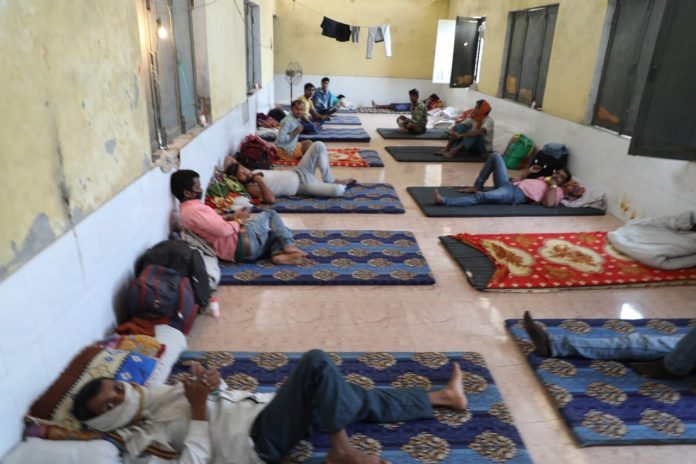By Musheera Ashraf, TwoCircles.net
Saharanpur: On April 26, videos of people at a COVID-19 quarantine centre in Agra being forced to crowd near the gate to receive essential supplies went viral forcing the senior officials to probe the matter. The district magistrate had ensured that the order has been issued and all is fine.
At another quarantine centre up north in Saharanpur – some 380 kilometres away from Agra, COVID-19 suspected patients are complaining of lack of facilities.
TwoCircles.net spoke to students who had been quarantined at the Centre. The students, who wished to remain anonymous, said that they are facing difficulties at the center.
“There were 4 toilets for around 150-200 people in the quarantine centre at Hari International Academy in Gagalheri area of Saharanpur. If anyone had to take bath then we had to sit under a tap which is near the sink,” a 25-year-old student said.
The student said he was taken to the quarantine centre despite being at home after the lockdown started.
“We were caged in a hall behind a door that was hardly 7 feet in height. We were not allowed to come outside the door which was locked and only opened to serve us food,” he said.
According to the people who have been quarantined the situation at the centre was not good and they blame the carelessness of the government in failing to cater to the basic hygiene and needs of the people.
The quarantined persons complain of poor food, sanitation and lack of physical distancing.
“No one wanted to talk to us and we were being treated as untouchables, in spite of our request to check the living condition inside the hall the police officials who came for inspection never bothered to enter the hall,” says Rehan who was quarantined at two centres.
He said the condition at the quarantine centre at Saraswati Vihar School, Saharanpur was quite good as compared to the other quarantine centres where he was kept afterwards.
After being tested negative for COVID-19 he was shifted to another centre to complete his quarantine period.
“The officials never allowed the family of the quarantined people to bring something from home and the food quality at the centre was also bad,” Rehan says.


Women whose children were quarantined with them would ask the officials if they could allow biscuits or milk powder from their home, but the officials would deny it, TwoCircles.net has learnt.
“Even the mosquito net was denied to be sent inside,” says Rehan.
The quarantined persons told TwoCircles.net that the workers at the centre would also run away from them and they were made to feel like untouchables.
Another person Junaid who was quarantined at IIT Roorkee Campus in Sheikhpora says the arrangements there were quite good, but it only lasted briefly as they were shifted.
“After our reports came negative, we were shifted to Dreams College in Saharanpur, where we faced the problem regarding food quality,” he told TwoCircles.net.
According to the data released by Health Ministry of India, there are 2998 confirmed corona cases in Uttar Pradesh out of which 1130 have recovered and 60 have died due to the disease.
In responding to the pandemic, Uttar Pradesh Chief Minister Yogi Adityanath asked officials to keep the quarantine centres, shelter homes and community kitchens ready for 10 lakh people as the state prepares for the return of migrant workers stranded in different states in India due to the coronavirus lockdown.
Rehan says that it was the Pradhan from a nearby village who would bring dates and fruits to them.
“This was a blessing for us inside the cage,” he says adding, “After our continuous complaints, the quality of food was not enhanced but they assured that they will surely help us out with the food problem in Ramadan.”
Masood Akhtar, the Congress MLA from Saharanpur constituency told TwoCircles.net that “they have been regularly trying to weed out the problem by talking to authorities.”
“It is the carelessness of the government that people are still facing such problems and the government should take necessary steps to resolve such matters,” he said.

